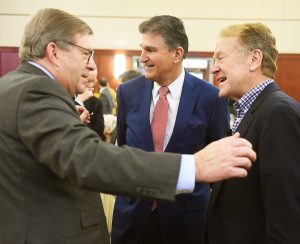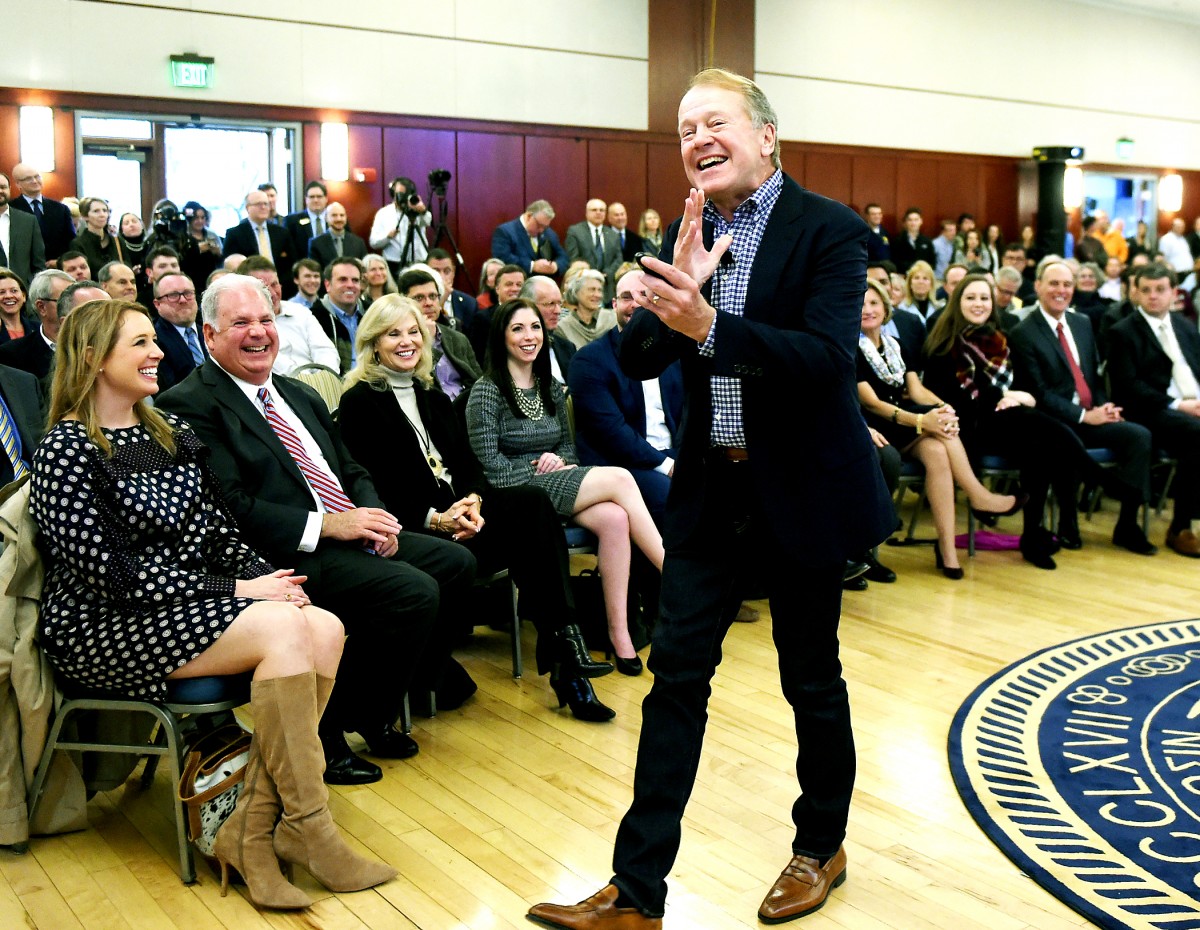MORGANTOWN – West Virginia University has renamed its business school as the John Chambers College of Business and Economics, after WVU alumnus and chairman emeritus of global technology giant Cisco Systems Inc.

Chambers and WVU also announced on Friday an agreement that will provide WVU “significant financial and intellectual resources” in the form of a gift of time, talent and treasure to support a recently announced start-up engine at the college. WVU and Chambers agreed not to disclose the dollar amount.
WVU held the announcement program at the Erickson Alumni Center. President Gordon Gee kicked it off.
“It is a glorious day in the life of our university,” he said. “I believe that the path to prosperity is one that requires a change in culture, a transformative way of thinking.”

The people who will move the state forward will be “innovative and disruptive in an ever-changing landscape,” and willing to fail and learn from those failures. “I want us to fail I order to succeed.”
Chambers earned business and law degrees from WVU. Before joining Cisco, he worked at IBM and Wang Laboratories. He joined Cisco as a senior executive in 1991. At the time it employed 400 and was worth $70 million.

He became CEO in 1995 and board chair in 2006, stepping down as CEO in 2015. During his tenure, Cisco acquired 180 companies and grew in value to $47 billion per year, employing 70,000. The promo copy for his new book, released in September – Connecting the Dots, subtitled Lessons for Leadership in a Startup World – says he turned more than 10,000 employees into millionaires.
He is now a venture capitalist and business coach, under his new job as CEO of JC2 Ventures, where he mentors and invests in startups – 16 so far.
Chambers began his talk on the state but quickly jumped down to circulate among the crowd.
“What I am excited about is how much I love this state, how much it’s meant to five generations of my family,” said. He’s also excited about this chance to make West Virginia a model for progress and change.
The WVU start-up engine will support business development, innovation and investment in West Virginia.
B&E Dean Javier Reyes will lead the initiative as vice president for Start-up West Virginia, coordinating efforts across the university that contribute to the state’s innovation economy.
Reyes also will work collaboratively with the leaders of West Virginia Forward, the state Department of Commerce, the National Guard and the governor’s office to grow and diversify West Virginia’s economy.
Chambers’ gift will include financial support to:
— build out and operate the start-up engine;
— create a philanthropic venture capital fund in support of the project;
— create a Center for Artificial Intelligence Management to explore AI’s opportunities and challenges;
— Establish a fund to support the creation of the Center for AI Management.
Chambers will also volunteer 5 percent of his time to provide expertise to WVU and its leadership, a similar arrangement to ones he has with Indian Prime Minister Narendra Modi and French President Emmanuel Macron.
Chambers told the crowd that digitization will destroy 20 to 40 percent of the jobs we know today. So we must create 25 million new jobs plus another 10 to 15 million for those being changed by the transition. The U.S. is lagging behind the world, though. We’re the only country without a national digitization and startup programs.
He said he believes all job growth will come out of startups or small companies getting bigger. Larger companies won’t add net new jobs and the young generation will drive job growth.
Broadband expansion will be a must, he said. “In this new world, if you’re not connected it’s like not being part of the interstate highway system.” Broadband is the connection to the internet and to education in the future.
The common factors among successful startups, successful geographic areas, and countries that successfully digitize, he said, “Is a vision and then having the courage to dream and to take the risk and know there will be bumps along the way and know that when a startup fails its going to hurt you.”
Failure happens, he said, and it’s essential to learn and keep going.
Among the politicians, dignitaries and business leaders attending the announcement were U.S. Sens. Shelley Moore Capito and Joe Manchin, state Senate President Mitch Carmichael and House Speaker Roger Hanshaw, former WVU Presidents David Hardesty and Mike Garrison, and representatives for Gov. Jim Justice and Rep. David McKinley.
Capito said afterward that Chambers laid out a vison Gee has been trying to formulate for the university.
Her role, she said, is to spur innovation through funding, promote workforce development and promote broadband. “We’re not digitized here yet. I think we’ve got to get the infrastructure part of this. … Broadband deployment is where we need to be all hands on deck.”
West Virginians also need to develop self-confidence, she said. “We have to have the confidence not just to try new things but also be willing to fail. … I think that’s where we as West Virginians are intimated too much by the possibility of failing.
Manchin noted that he and Chambers have been friends for years, and Chambers came to his aid when he was governor and needed to build government broadband connectivity.
“For him to come in and make this major contribution … is just going to be absolutely contagious,” Machin said.
For his part, Manchin is also promoting broadband deployment, through the $4.5 billion rural broadband initiative.
Manchin also noted that he didn’t know for years that Chambers is a Republican. They just worked together. “Passion should supersede that tribal mentality.”
In a sit-down afterward, Chambers noted that every startup will have a large technology component. “Everything’s going to be connected in ways we’re just beginning to dream.”
To move forward, education needs to be transformed, he said. “Unfortunately our K-through-12 system is broken. We’re not competitive on a global basis and we’ve got to change it.” Otherwise people won’t have the skill s they need to do the startups.
STEM education is just one element of that, he said. Now we need technology and entrepreneurism education.
WVU Provost Joyce McConnell expanded on that. Successful leaders can see the world, see patterns. That doesn’t come from STEM, but from thinking broadly, boldly and creatively. Children are naturally curious.
Schools should help kids capture that curiosity, she said. Chambers replied that, instead, schools take that out of them and mold them into a rote pattern.
Gee said progress requires people who are bold, with a willingness to look around corners. “We’re training people to build buggy whips right now. We’ve got to figure out to train them to go to the stars.”
Tweet David Beard @dbeardtdp Email dbeard@dominionpost.com




